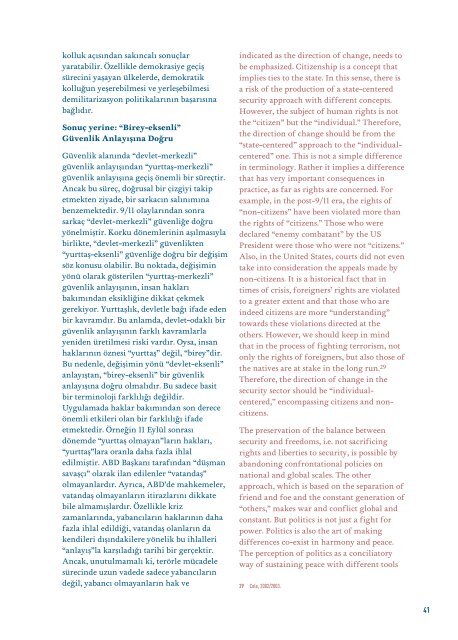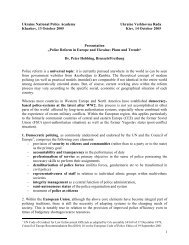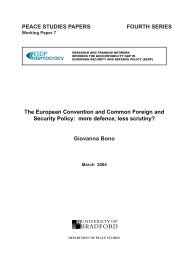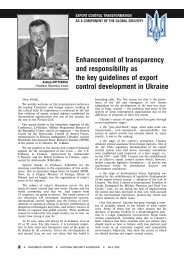Security Sector Governance: Turkey and Europe - DCAF
Security Sector Governance: Turkey and Europe - DCAF
Security Sector Governance: Turkey and Europe - DCAF
Create successful ePaper yourself
Turn your PDF publications into a flip-book with our unique Google optimized e-Paper software.
kolluk aç›s›ndan sak›ncal› sonuçlar<br />
yaratabilir. Özellikle demokrasiye geçifl<br />
sürecini yaflayan ülkelerde, demokratik<br />
kollu¤un yeflerebilmesi ve yerleflebilmesi<br />
demilitarizasyon politikalar›n›n baflar›s›na<br />
ba¤l›d›r.<br />
Sonuç yerine: “Birey-eksenli”<br />
Güvenlik Anlay›fl›na Do¤ru<br />
Güvenlik alan›nda “devlet-merkezli”<br />
güvenlik anlay›fl›ndan “yurttafl-merkezli”<br />
güvenlik anlay›fl›na geçifl önemli bir süreçtir.<br />
Ancak bu süreç, do¤rusal bir çizgiyi takip<br />
etmekten ziyade, bir sarkac›n sal›n›m›na<br />
benzemektedir. 9/11 olaylar›ndan sonra<br />
sarkaç “devlet-merkezli” güvenli¤e do¤ru<br />
yönelmifltir. Korku dönemlerinin afl›lmas›yla<br />
birlikte, “devlet-merkezli” güvenlikten<br />
“yurttafl-eksenli” güvenli¤e do¤ru bir de¤iflim<br />
söz konusu olabilir. Bu noktada, de¤iflimin<br />
yönü olarak gösterilen “yurttafl-merkezli”<br />
güvenlik anlay›fl›n›n, insan haklar›<br />
bak›m›ndan eksikli¤ine dikkat çekmek<br />
gerekiyor. Yurttafll›k, devletle ba¤› ifade eden<br />
bir kavramd›r. Bu anlamda, devlet-odakl› bir<br />
güvenlik anlay›fl›n›n farkl› kavramlarla<br />
yeniden üretilmesi riski vard›r. Oysa, insan<br />
haklar›n›n öznesi “yurttafl” de¤il, “birey”dir.<br />
Bu nedenle, de¤iflimin yönü “devlet-eksenli”<br />
anlay›fltan, “birey-eksenli” bir güvenlik<br />
anlay›fl›na do¤ru olmal›d›r. Bu sadece basit<br />
bir terminoloji farkl›l›¤› de¤ildir.<br />
Uygulamada haklar bak›m›ndan son derece<br />
önemli etkileri olan bir farkl›l›¤› ifade<br />
etmektedir. Örne¤in 11 Eylül sonras›<br />
dönemde “yurttafl olmayan”lar›n haklar›,<br />
“yurttafl”lara oranla daha fazla ihlal<br />
edilmifltir. ABD Baflkan› taraf›ndan “düflman<br />
savaflç›” olarak ilan edilenler “vat<strong>and</strong>afl”<br />
olmayanlard›r. Ayr›ca, ABD’de mahkemeler,<br />
vat<strong>and</strong>afl olmayanlar›n itirazlar›n› dikkate<br />
bile almam›fllard›r. Özellikle kriz<br />
zamanlar›nda, yabanc›lar›n haklar›n›n daha<br />
fazla ihlal edildi¤i, vat<strong>and</strong>afl olanlar›n da<br />
kendileri d›fl›ndakilere yönelik bu ihlalleri<br />
“anlay›fl”la karfl›lad›¤› tarihi bir gerçektir.<br />
Ancak, unutulmamal› ki, terörle mücadele<br />
sürecinde uzun vadede sadece yabanc›lar›n<br />
de¤il, yabanc› olmayanlar›n hak ve<br />
indicated as the direction of change, needs to<br />
be emphasized. Citizenship is a concept that<br />
implies ties to the state. In this sense, there is<br />
a risk of the production of a state-centered<br />
security approach with different concepts.<br />
However, the subject of human rights is not<br />
the “citizen” but the “individual.” Therefore,<br />
the direction of change should be from the<br />
“state-centered” approach to the “individualcentered”<br />
one. This is not a simple difference<br />
in terminology. Rather it implies a difference<br />
that has very important consequences in<br />
practice, as far as rights are concerned. For<br />
example, in the post-9/11 era, the rights of<br />
“non-citizens” have been violated more than<br />
the rights of “citizens.” Those who were<br />
declared “enemy combatant” by the US<br />
President were those who were not “citizens.”<br />
Also, in the United States, courts did not even<br />
take into consideration the appeals made by<br />
non-citizens. It is a historical fact that in<br />
times of crisis, foreigners’ rights are violated<br />
to a greater extent <strong>and</strong> that those who are<br />
indeed citizens are more “underst<strong>and</strong>ing”<br />
towards these violations directed at the<br />
others. However, we should keep in mind<br />
that in the process of fighting terrorism, not<br />
only the rights of foreigners, but also those of<br />
the natives are at stake in the long run. 29<br />
Therefore, the direction of change in the<br />
security sector should be “individualcentered,”<br />
encompassing citizens <strong>and</strong> noncitizens.<br />
The preservation of the balance between<br />
security <strong>and</strong> freedoms, i.e. not sacrificing<br />
rights <strong>and</strong> liberties to security, is possible by<br />
ab<strong>and</strong>oning confrontational policies on<br />
national <strong>and</strong> global scales. The other<br />
approach, which is based on the separation of<br />
friend <strong>and</strong> foe <strong>and</strong> the constant generation of<br />
“others,” makes war <strong>and</strong> conflict global <strong>and</strong><br />
constant. But politics is not just a fight for<br />
power. Politics is also the art of making<br />
differences co-exist in harmony <strong>and</strong> peace.<br />
The perception of politics as a conciliatory<br />
way of sustaining peace with different tools<br />
29 Cole, 2002/2003.<br />
41

















